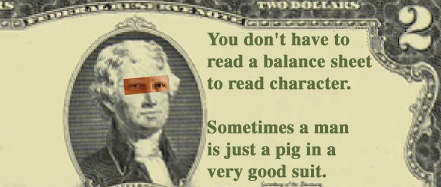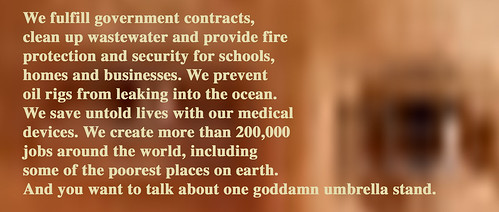I'm with Stupid

Long before the Sardinian toga party, Dennis Kozlowski was not regarded as a paragon of business ethics. In fact, I heard one senior executive in a Fortune 100 company describe him as the opposite, someone whose piratical business practices cast a shadow over all his peers.
Now a jury of other "peers" has convicted the former Tyco chairman after a previous trial failed to deliver verdict. As Kurt Eichenwald of the New York Times writes:
"The defense of claiming ignorance or foolishness has been widely derided as difficult to believe. But legal analysts said that, given the circumstances of the cases, the defendants were hard pressed to argue anything else. There was no denying, for example, that Mr. Kozlowski received huge sums that he did not report on his taxes or in corporate filings.
"Similarly, in the WorldCom case, with the former chief financial officer, Scott D. Sullivan, testifying about his role in that company's accounting fraud, it was impossible for Mr. Ebbers to argue that wrongdoing did not occur. Ignorance and sloppiness were the only defenses left."
The "I wasn't paying attention" defense doesn't wash in most jobs, especially when a train wreck results. When the inattentive engineer is pulling down seven figures in salary and eight figures in stock options, the wage slaves in the jury box are even more likely to be unsympathetic.
Despite the humiliation for these CEegoes to testify they were not on top of what their businesses were doing, it was likely the best legal strategy for someone who cannot prove themselves innocent — since they're not. They can only cast doubt and confusion and hope to hang another jury, as Kozlowski did once and Richard Scrushy has managed to do so far. (The Kozlowski case seems more preposterous, since his claim of ignorance extends to his personal financial dealings.)
As unsympathetic as I am to these guys, I have to acknowledge the grain of truth in their arguments. I would bet that Kozlowski, in his alleged disinterest in the details of tax filings, is fairly typical of those who will never have to worry about putting food on the table for the next three generations. He pays people to worry about the details, just like he hires gardeners, interior decorators and living Roman statues. The effect of selective stupidity magnifies exponentially when it moves beyond personal affairs. Well before an organization reaches the size and complexity of Tyco or HealthSouth or WorldCom or the United States Military, its totality is truly beyond the full grasp of even the most exceptional leader.
Most CEOs I've met fall into two general categories. Their attention is focused in one area, such as finance, marketing or operations, to the near-exclusion of the rest. Or they are more rounded and global, but not immersed in the details. Either type of leader must encourage a culture that deals with reality, recognizes what's important and speaks the truth about it to the boss. The person at the top can't possibly know what's going in the Venezuelan subsidiary or the Abu Ghraib prison unless others have the clear belief that the boss expects people to do what's right, wants to know what's wrong and won't shoot them for bringing it forward.
This, of course, is where some organizations — not just their leaders — fall down.
Do they remain willfully ignorant? Do they wink? Or are they totally out front with the greed is good mantra?
Until they have to defend it in court, compartmentalized ignorance probably seems like a smart strategy.





1 Comments:
Editorial Note
The eyes belong to Dennis Kozlowski, but the words in the illustrations come from my book, Counterfeit: Reading Corporate Characters, which masks our denominated Presidents with eyes taken from corporate leaders and mass murderers.
Kozlowski's eyes were the only ones honored with two representations.
Post a Comment
<< Home